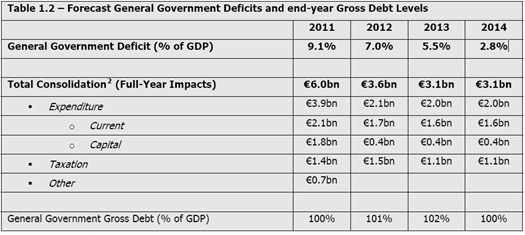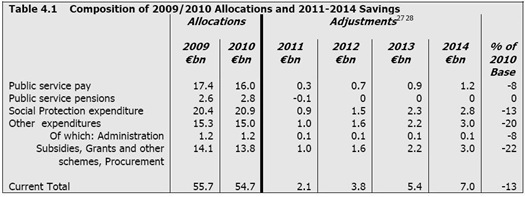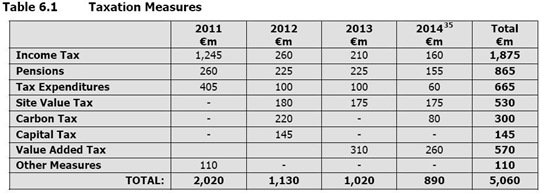The above is sure to be a common refrain over the coming months as the government sets about introducing it’s first budget in December. Over the summer a €100 household charge was announced and when introducing it Minister for the Environment Phil Hogan said:
“I’d prefer not to be introducing any charges but I’m obliged because we have ceded our economic sovereignty as part of the EU/IMF agreement, to bring in a property tax.”
The suggestion is that the charge is only being introduced because of the EU/IMF programme. This fails to acknowledge that the originator for the idea was the ‘Four Year National Recovery Plan’ published by the Department of Finance on the 24th of November last year under the previous government. This is lifted directly from the 140-page document.
The IMF didn’t come up with a €100 household charge to be imposed from 2012; we did that ourselves. In fact the greater amount of the IMF programme for Ireland comes from the Four Year Plan that we produced ourselves. In a press conference when the IMF intervention in Ireland was announced at the end of November, Ajai Chopra said when asked to rate Ireland’s future prospects:
“What we’re doing right now is helping in this process and making it more robust. We’re augmenting it in some places, and we’re providing a backstop in financing. But the key thing that this is […] a program that is largely designed by the Irish authorities, we’re augmenting what they did already, and the thing that has impressed me most in this regard is the sense of common purpose. The thinking ahead and making a contribution to the solution. So, it’s been very impressive what they’ve done.”
In a subsequent interview on December 17th once the details of the IMF programme has been finalised, Chopra said:
“The fiscal adjustment program is based on the government's 4-year program for national recovery. […] There may be some adjustments to these policies, but our experience is that if the policies are not owned by the country, they tend not to be implemented strongly enough. In sum, we see this a program that is an Irish program that is a national response that is owned by Ireland.”
The Four-Year Plan from the DoF laid out in general the direction of our budgetary policies until the end of 2014. Apart from the hugely optimistic growth forecasts that were in the plan it was largely endorsed by the IMF. The €3.6 billion of tax rises and expenditure cuts that is due in the December budget was also proposed before the IMF programme was agreed.
The IMF accepted the €15.8 billion of proposed tax rises and expenditure cuts over the duration of the plan but did not accept that it would bring the annual deficit under 3% by 2014 (or even 2015 for that matter).
The Four-Year Plan provides some specifics of the measures to be introduced. Although the following table provides cumulative figures it shows the breakdown of the €1.7 billion of current expenditure cuts to be introduced for 2012.
It was proposed to save €0.4 billion on public service pay, €0.6 billion on social protection expenditure and €0.6 billion on “other expenditures”. On the tax side the following details were provided.
There’s Phil Hogan’s ‘Site Value Tax’ and other measures. We can expect the price of fuel to go up in the first week of December. Even more detail of the tax increases was provided in this table.
It is likely that the greater majority of the measures to be introduced in December will have had their genesis in the Four-Year Plan. While this was published prior to any IMF intervention in Ireland, it is now accepted that the IMF were in contact with Ireland well in advance of the announcement of the formal agreement on the 28th of November. Again, Ajai Chopra provides the details:
“So, over the months, we’ve been in touch, we’ve talked on the phone, we followed the developments, we’ve tried to understand the various steps that the authorities have taken. And then last week, as you know, after the Eurogroup meeting in Brussels, a small team was invited to come here for short, technical discussions. So, following the technical discussions, the authorities decided they had the basis and the need to request us to (inaudible) together with them a package of policy measures that we could support with our financing.”
The IMF had be “in touch” for months prior to the end of November and may have had some input into the design of the Four-Year Plan, but that document was published in the absence of any formal agreement with the IMF and is primarily what we agreed to do ourselves.
Claiming that “the IMF made me do it” may make for a catchy political sound-bite but we need to face the reality of the mess we are in and accept to responsibility to solve it. Creating public animosity with the only institutions willing to lend to us by trying to blame them for the tax rises and expenditure cuts to be introduced is not a useful approach.
Tweet






Hi Seamus,
ReplyDeleteGreat post, thanks. i'll be watching the budget with interest to see how right you are.
It begs the question, "What are the new government up to"? They don't seem to be doing very much at all, especially since most of the cuts and taxes have been worked out for them.
There's evidence to suggest that cutting personal taxes is the one sure fire way of ending a recession earlier than the natural recovery that will eventually occur. I see masses of waste still in the public service. Any idea why they are not cutting back more rather than raising taxes?
Steve